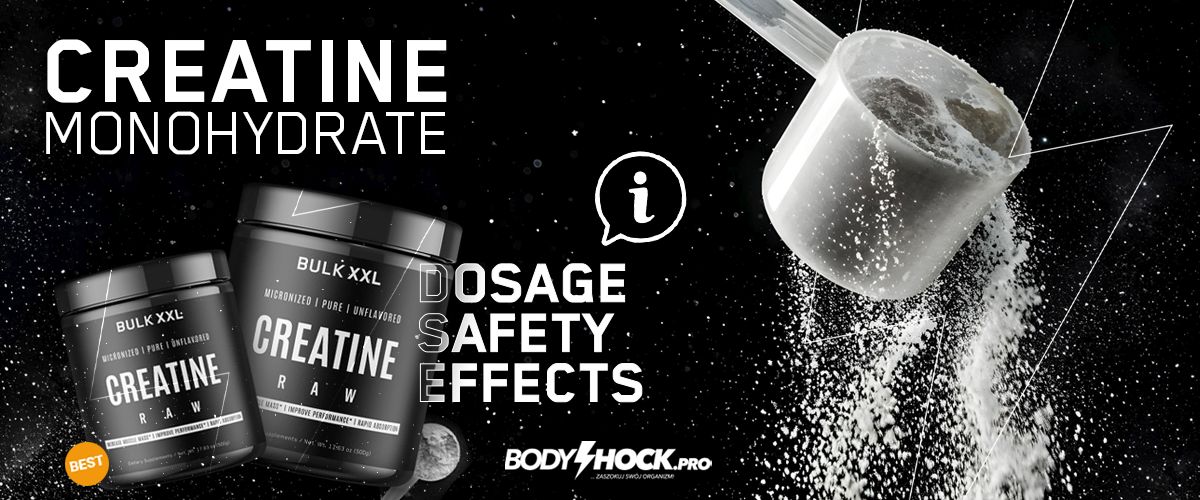
- Sport Medica Creatine Monohydrate 300g - the highest quality creatine
Sport Medica Creatine Monohydrate 300g - the best quality
Sport Medica Creatine Monohydrate is a dietary supplement providing pure creatine without additives! High quality is the main feature describing the Sport Medica brand, which provides the best quality peptides and supplements supporting muscle work. Creatine is very popular because it works and has practically no side effects!
Creatine works universally
It was once believed that creatine was only suitable for people who wanted to build muscle. Currently, creatine monohydrate is widely used in sports supplementation, but not only. Creatine enjoys recognition even in the medical community. It has been shown to be a helpful supplement in the fight against various diseases and to maintain brain function for a longer period of time.
What is creatine and how does it work?
Creatine is a naturally occurring chemical compound in the body, synthesized primarily in the liver, kidneys, and pancreas from the amino acids arginine, glycine, and methionine. Most of the creatine in our bodies (about 95%) is stored in skeletal muscle, in two main forms: free creatine and phosphocreatine (also known as creatine phosphate). Small amounts of creatine are also found in the brain and testicles.
Creatine monohydrate is a form of creatine bound to a water molecule (mono + hydrate = one hydrogen atom + water). It is the purest, most stable and best-studied form of creatine available on the market. Scientific research has repeatedly confirmed its effectiveness in improving athletic performance.
Role in physical exercise
The key role of creatine in the context of physical exercise is its participation in the phosphagen energy system. This system is the main source of energy during very intense, short-term efforts, such as sprinting, lifting weights, jumping or dynamic changes of direction. When a muscle contracts with maximum force, it needs immediate energy in the form of ATP (adenosine triphosphate). However, the stores of ATP in the muscles are very limited and are depleted within just a few seconds of intense exercise.
Creatine helps store energy
This is where phosphocreatine comes into play. Phosphocreatine acts as an "energy store," quickly giving up its phosphate group to ADP (adenosine diphosphate), converting it back to ATP. This reaction is catalyzed by the enzyme creatine kinase. The more phosphocreatine is stored in the muscles, the longer and with greater intensity we can perform anaerobic efforts.
Creatine supplementation, and in particular creatine monohydrate, is intended to increase the total stores of creatine in the muscles, including phosphocreatine. Higher phosphocreatine levels allow for faster ATP resynthesis during short, intense efforts, which translates into increased strength, power, and anaerobic capacity.
What benefits does this bring to your workouts?
Increased Muscle Strength and Power
This is probably the best-known benefit of creatine. Increased phosphocreatine availability allows for greater force generation during short, maximal efforts. This translates into the ability to lift heavier weights, perform more reps in high-intensity sets, and improve performance in disciplines requiring explosive strength, such as sprints, jumps, and throws.
Improve Exercise Capacity
Creatine not only increases strength, but also allows for a greater volume of training work during short, intense exercises. Thanks to faster ATP regeneration between sets or repetitions, we are able to perform more repetitions or sets with a given load, which over time translates into better training adaptations and greater progress. This applies to both strength training and interval sports.
Support for Building Muscle Mass
Although creatine itself does not "build" muscle directly (like protein), it indirectly supports this process. Increased strength and efficiency allow for more effective training, which is a key stimulus for muscle growth (hypertrophy). In addition, creatine increases muscle cell hydration, which can signal the cells to grow and increase their volume. The effect of "pumping up" the muscles pabout starting creatine supplementation is often noticeable and results from intracellular water retention.
Acceleration of Muscle Recovery
Intensive training leads to damage to microscopic muscle fibers. Creatine can support the regeneration process on several levels. First, by faster rebuilding of energy resources (ATP and phosphocreatine), muscles are ready for the next effort faster. Second, some studies suggest that creatine may have some effect on reducing markers of muscle damage after intense exercise, which may accelerate the repair and reconstruction process. Better recovery means you can train more often or harder, which translates into faster progress.
Potential Cognitive Benefits
A growing body of research suggests that creatine may also have a positive impact on brain function. Like muscles, the brain uses ATP as an energy source, and neurons also contain creatine and phosphocreatine. Creatine supplementation can increase creatine levels in the brain, potentially supporting cognitive processes such as short-term memory, fluid intelligence, and the ability to handle mental stress, especially in situations of sleep deprivation or stress.
Creatine Dosage
1 serving, 5 grams per day
Creatine Frequently Asked Questions
Does Creatine Cause Hair Loss?
This is a popular myth that is not supported by scientific research. There is one study that suggested a potential increase in DHT (a hormone associated with male pattern baldness) in rugby players taking creatine, but these results have not been confirmed in other, more rigorous studies. Current scientific evidence does not indicate a link between creatine supplementation and hair loss.
Is Creatine Just for Men?
Absolutely not. Creatine is effective in both men and women. The benefits of increased strength, power, and anaerobic capacity apply to both sexes. Women who use creatine may also see improved training performance and help build lean body mass. Dosing is typically the same as for men, although slightly lower maintenance doses may be considered for lighter women.
Do I Need to Take Breaks from Creatine Supplementation?
There are no strict scientific guidelines for taking breaks from creatine use in healthy individuals. Some people choose to cycle creatine (e.g. 8-12 weeks on, then 4 weeks off), but there is no evidence that this is necessary for efficacy or safety. Regular, consistent maintenance dosing is effective in maintaining muscle saturation.
Does Creatine Negatively Affect the Kidneys?
A much-repeated myth. Extensive scientific research in healthy individuals has not shown any negative impact of standard creatine supplementation on kidney function. An increase in creatinine levels in blood tests during supplementation is normal and results from increased breakdown of creatine to creatinine, but does not indicate kidney damage. However, people with existing kidney disease should consult a doctor.
Guide





